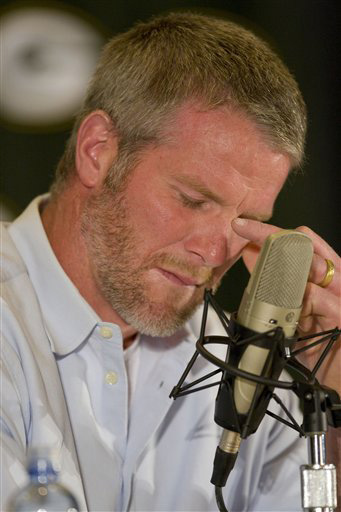Favre rules out return to playing football

Green Bay Packers quarterback Brett Favre gets choked up as he talks about his retirement Thursday March 6, 2008 during a news conference at Lambeau Field in Green Bay, Wis Mike Roemer
March 6, 2008
GREEN BAY, Wis. (AP) _ Brett Favre made it clear Thursday that he’s finished with football.
“I know I can play but I don’t think I want to,” a teary Favre said in a news conference at Lambeau Field two days after he announced his retirement. “It’s been a great career for me, but it’s over.”
“As they say, all good things must come to an end. I look forward to whatever the future may hold for me.”
With that, Favre walked away from a 17-year NFL career, taking with him a Super Bowl victory, virtually every quarterback record worth having and the widespread admiration of his peers and fans.
The 38-year-old Favre also leaves with graying hair and a deliberate gait – signs that the years were quietly taking a toll on the man who was celebrated for playing a serious and precise game with the carefree joy of a little boy.
Get The Daily Illini in your inbox!
He cried Thursday morning as he discussed his decision.
“I promised I wouldn’t get emotional,” he said. But as the tears flowed, he added, “I’ve watched hundreds of players retire and you wonder what that would be like. You think you’re prepared …”
Favre thanked the Packers for letting him play.
“I hope that with every penny they’ve spent on me, they know it was money well spent,” he said. “It wasn’t about the money or fame or records. I hear people talk about your accomplishments and things. It was never my accomplishments, it was our accomplishments.”
Favre is the NFL’s only three-time MVP, and leads the league with 442 touchdown passes, 61,655 yards passing and 160 career victories. He started 253 consecutive regular-season games, more than any other quarterback in history.
Favre also holds the more dubious mark of 288 interceptions – an indication of the wild streak that only made him more human to the fans who adored him.
The same was true of Favre’s highly publicized struggles with an addiction to prescription painkillers, his support of his wife, Deanna, through a battle with breast cancer, and a memorable Monday night game against Oakland after he lost his father.
Favre’s exit comes after a remarkable 2007 season, but his final pass was one to forget: An interception in overtime of the NFC championship game, a mistake that set up the New York Giants’ field goal that sent the Packers home instead of to the Super Bowl.
Most folks figured Favre couldn’t exit the stage that way, especially when he had at least one more good year left in him.
But barring a change of heart in the upcoming weeks, months or years, the final chapter in his storied football career began Monday night.
Favre called Packers coach Mike McCarthy and told him he planned to retire, then finalized his decision in a conversation with Packers general manager Ted Thompson on Tuesday morning.
But until Thursday’s news conference, Favre hadn’t explained his decision to his fans. His only public comment was a short voicemail to an ESPN reporter in which he cited fatigue as the main reason for his retirement.
Sure, he said, he could come back. But anything less than a Super Bowl victory would be considered a failure. And even as the leader of a young team on the rise, a Super Bowl was anything but guaranteed.
Favre’s retirement came as a surprise to Packers executives, coaches and teammates, virtually all of whom expected him to return. And it was a shock to fans who sat patiently, year after year, while Favre flirted openly with retirement – because, of course, he never really meant it.
To a generation of fans who watched Favre start every game since taking over as the Packers’ starting quarterback during the 1992 season, it didn’t make sense. He wouldn’t just decide he was too tired to play and walk away.
Would he?
Recent comments by Favre’s agent, Bus Cook, stirred suspicions about the “real” reason Favre was retiring.
Had the Packers’ front office not done enough to talk him into coming back?
Was Favre’s retirement a knee-jerk reaction to the fact that wide receiver Randy Moss, a player Favre had lobbied the Packers to sign a year ago, had re-signed with the New England Patriots without an apparent effort from the Packers?
McCarthy and Thompson tried to quell such concerns in a news conference without Favre on Tuesday. Thompson called Favre’s decision “complex,” but one he considered final.
But others who know Favre had doubts that he would be able to spend Sundays on the couch when he still had the ability to play.
“As the season gets closer, I wouldn’t be surprised at all if he changes his mind,” Hall of Fame quarterback Troy Aikman said.
But Packers chairman emeritus Bob Harlan said it would be a shame to see Favre try a halfhearted comeback, as late Packers defensive end Reggie White did with Carolina in 2000.
“I’ve always felt badly that Reggie came back and played that year at Carolina because he wasn’t the same Reggie White,” Harlan said. “And I think it’d be very sad to see that this wasn’t the same Brett Favre. He has been so magnificent. He went out on top: great season, great team record. It’s a great way for him to exit and add to his legacy.”






